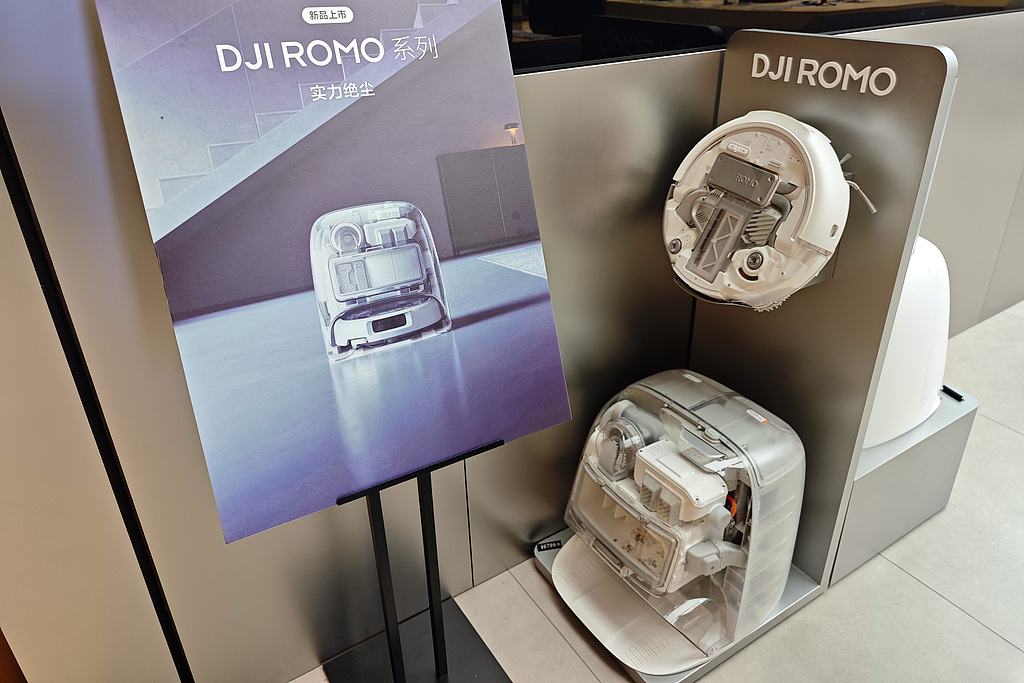
Competition in China's robotic vacuum cleaners market is intensifying, with DJI, the world's largest commercial drone manufacturer by market share, recently marking its entry into the fast-developing cleaning appliances sector.
Industry experts said cutting-edge digital technologies, such as artificial intelligence-powered algorithms, voice control alongside intelligent mapping and navigation to avoid collisions with obstacles, have been increasingly applied in smart vacuum cleaners to meet evolving consumer needs.
Featuring environmental perception and intelligent path planning capacities, and machine learning algorithms, DJI's smart vacuum cleaner can detect and avoid obstacles at home, the company said.
READ MORE: Chinese companies shine at world's premier tech show
The Shenzhen, Guangdong province-based company has accumulated technological strengths in areas such as drones, flight control, sensors, and navigation systems, positioning the newly launched device as a premium smart cleaning solution.
"As users increasingly pursue a higher quality of life, their expectations for robot vacuums have gone beyond basic cleaning," said Zhang Xiaonan, DJI's senior director of corporate strategy, adding that consumers have a greater demand for various functionalities, including reliable obstacle avoidance, smarter mapping and path planning.
According to a report by Beijing-based market consultancy All View Cloud, the penetration rates for robotic vacuum cleaners and floor-cleaning machines in China have reached 5.5 percent and 3.1 percent, respectively.
Driven by the country's consumer goods trade-in program, the online retail sales of robotic vacuum cleaners increased by 45.5 percent year-on-year in the first half of the year, said the consultancy, adding that consumers have shown a rising demand for robotic vacuum cleaners and sweeping robots.
The AVC report said Chinese-made robotic vacuum cleaners have gained in popularity among overseas consumers, especially those in Germany, the United States, Japan and Australia.
Data from market consultancy IDC showed that global shipments of smart home cleaning robots are projected to reach 32.1 million units in 2025, marking a year-on-year increase of 28.2 percent. The compound annual growth rate is expected to reach 26 percent by 2028.
Chinese cleaning appliance makers have invested heavily in promoting technological advances and optimizing product functions to cater to the diversified and personalized needs of shoppers overseas.
Dreame Technology is accelerating steps to make inroads into overseas markets and is investing heavily in research and development, while making technological innovation based on user demand.
Currently, the company's products are sold in more than 100 countries and regions, including Europe, North America, Southeast Asia, East Asia, the Middle East, Africa and South America. Revenue from international markets accounted for 65 percent of its total revenue in 2024.
Global sales of the company's robotic vacuum cleaners and floor-cleaning machines increased by 178 percent and 100 percent year-on-year, respectively, from January to May, ranking first in 18 countries and regions around the world.
Yu Hao, founder and CEO of Dreame Technology, emphasized the significance of increasing investment in supply chain systems, building independent production capacity covering the entire industrial chain and establishing global retail channels.
It is eyeing huge growth potential from the high-end robotic vacuum market, and the compound annual growth rate of its revenue has surpassed 100 percent in the past few years. Yu said the company will take active steps to expand into overseas markets and recruit high-quality talent worldwide.
ALSO READ: BYD, DJI unveil intelligent vehicle-mounted drone system
"China's cleaning appliances industry is expected to witness speedy growth fueled by advances in technology and product iteration, as well as the gradual release of immense consumption potential from smaller cities," said Guo Meide, president of AVC.
Chinese intelligent home appliance makers are improving their independent innovation capacities and applying AI-powered large language models to make the products more intelligent, said Liang Zhenpeng, an independent consumer electronics analyst.
Liang said they are stepping up their operations in the global market to improve competitiveness and foster a new growth engine for their long-term development, which will greatly boost the transformation and upgrading of traditional manufacturing.
Contact the writer at fanfeifei@chinadaily.com.cn


